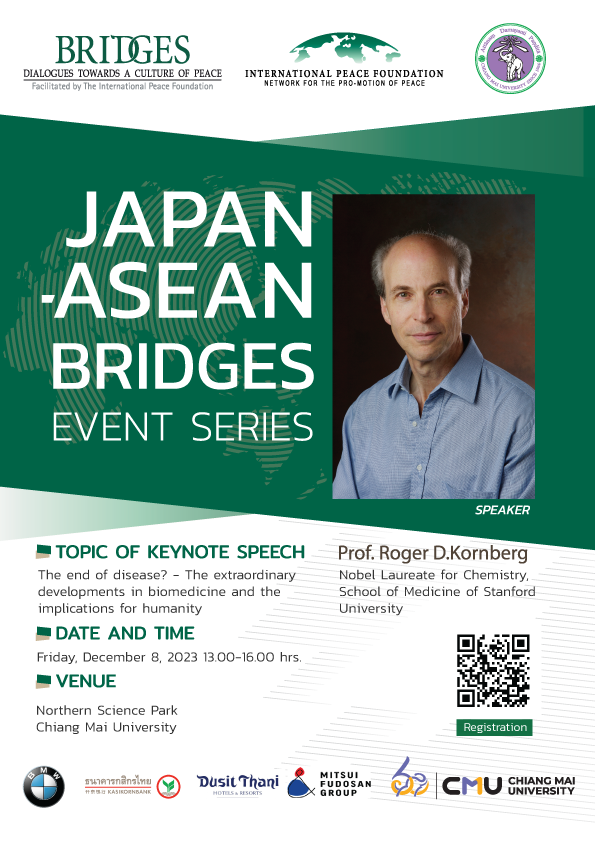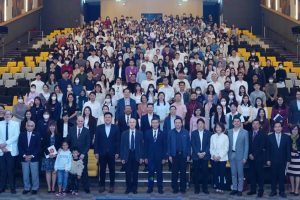Nobel 2023

List
Register
Nobel Laureate Lecture Registration
Biography of the keynote
Short biography:
Prof. Roger D. Kornberg is an American biochemist and Professor of Structural Biology at Stanford University School of Medicine. He was awarded the Nobel Prize for Chemistry for his studies of the molecular basis of eukaryotic transcription which explains the process by which genetic information from DNA is copied to RNA. In elucidating the inner workings of RNA his research team has isolated the proteins responsible for transcription and gene regulation, including those that form a mediator to regulate the process. The team determined the structure of the entire transcription machinery at near atomic resolution. The structure helps explain how disease can result when transcription goes awry and offers the potential for unlocking new therapeutic approaches for the treatments of cancer, heart disease and various kinds of inflammation. During his life’s work Professor Kornberg’s closest collaborator has been his wife, Dr. Yahli Lorch, while his father, Prof. Arthur Kornberg, received the Nobel Prize in Medicine for studies of how genetic information is transferred from one DNA molecule to another in a process called DNA replication.
Long biography:
Professor Roger David Kornberg is an American biochemist and professor of structural biology at Stanford University’s School of Medicine who was solely awarded the Nobel Prize in Chemistry in 2006 for his studies of the molecular basis of eukaryotic transcription. This explained the process by which genetic information from DNA is copied to RNA.
All organisms are to some extent controlled by their genetic makeup. In order for the organism to make use of the information stored in the genes, a copy must first be made and transferred to the outer parts of the cells. The process by which the genes are copied is called transcription. Transcription makes an RNA copy of a region of the DNA that comprises the gene in question. The RNA is subsequently transported out of the nucleus, where it performs its function. Most of this so-called messenger RNA serves as instructions for protein production in a process called translation. In most cases proteins perform a cellular function specified by the gene. The enzyme responsible for the synthesis of protein-coding mRNA is termed RNA polymerase II. Professor Kornberg has worked to understand this process in eukaryotes, a huge evolutionary group encompassing all organisms with well-defined nuclei, everything from yeast to humans.
In contrast to bacterial RNA polymerases, eukaryotic RNA polymerases are alone incapable of gene transcription and require a complex assembly of accessory proteins to accomplish this task in an accurate and efficient manner.
Roger Kornberg and his research group have made several fundamental discoveries concerning the mechanisms and regulation of eukaryotic transcription. While a postdoctoral fellow working with Aaron Klug and Francis Crick at the MRC in the 1970s, Kornberg discovered the nucleosome as the basic protein complex packaging chromosomal DNA in the nucleus of eukaryotic cells. His research group at Stanford later succeeded in the development of a faithful transcription system from baker’s yeast, which they then used to isolate in a purified form all of the several dozen proteins required for the transcription process. The team went on to determine the structure of the entire set of transcription proteins at near atomic resolution.
Using this system, Professor Kornberg made the major discovery that transmission of gene regulatory signals to the RNA polymerase machinery is accomplished by an additional protein complex that they dubbed Mediator. As noted by the Nobel Prize committee, “the great complexity of eukaryotic organisms is actually enabled by the fine interplay between tissue-specific substances, enhancers in the DNA and Mediator. The discovery of Mediator is therefore a true milestone in the understanding of the transcription process,” and this made the detailed description of the mechanism Professor Kornberg provided exactly the kind of “most important chemical discovery” referred to by Alfred Nobel in his will.
If transcription stops, genetic information is no longer transferred into the different parts of the body. Since these are then no longer renewed, the organism dies within a few days. Understanding of how transcription works has therefore a fundamental medical importance. Disturbances in the transcription process are involved in many human illnesses such as cancer, heart disease and various kinds of inflammation.
The capacity of stem cells to develop into different types of specific cells with well-defined functions in different organs is also linked to how the transcription is regulated. Understanding more about the transcription process is therefore important for the development of different therapeutic applications of stem cells. In 1959 Roger Kornberg’s father, Arthur Kornberg, received the Nobel Prize in Medicine for studies of how genetic information is transferred from one DNA molecule to another in a process called DNA replication. Roger and Arthur Kornberg are the sixth father-son pair to win Nobel Prizes.
Apart from the Nobel Prize, Professor Roger Kornberg’s honors include the General Motors Cancer Research Foundation’s Alfred P. Sloan Jr. Prize, Le Grand Prix Charles-Leopold Mayer from the French Academy of Sciences and the Welch Prize. He is a member of the Advisory Board of the International Peace Foundation, the United States National Academy of Sciences, a fellow of the American Academy of Arts and Sciences
and an honorary member of the Japanese Biochemical Society. His closest collaborator has been his wife, Dr. Yahli Lorch, and they have three children, Guy, Maya and Gil.
Topics of keynote speeches:
- The end of disease? – The extraordinary developments in biomedicine and the implications for humanity
- Science as a basis for building bridges and fostering peace and development
- Mortal threats to mankind: Problems and solutions
Abstracts of keynote speeches:
· Mortal threats to mankind: Problems and solutions
The threats of climate change and of global pandemics are well known. Despite extensive discussion of the potentially catastrophic consequences of climate change, meaningful action to address the problem is too slow and almost certainly too late. I will present a stunning discovery from materials science that could solve the problem, and change the way power is generated and consumed. The problem of global pandemics is different, as the problem of COVID19 recedes into the background and public concern recedes with it. But the problem of global pandemics has not changed, and there is deep concern among health authorities that a far more dangerous pandemic is developing now and may soon be upon us.
Professor Kornberg will present a remarkable solution to the problem of future pandemic preparedness. Implementation of this solution by governments and industry will assure that there will never be another pandemic. The implications go further, to the elimination of all viral respiratory disease, the major affliction of mankind, and to the treatment and cure of the vast majority of human health problems. Finally there is the problem of human exposure to polluted air, specifically the small particulate matter (PM2.5) that permeates our environments indoors and outdoors. Exposure to PM2.5 is the single greatest threat to human health globally, killing over 10 million people every year and costing the global economy upward of $8T. Behavioral studies have shown that with personalized data, people take tried and true methods to protect themselves. Professor Kornberg will present an ingenious software solution that can empower people all over the globe to protect themselves at little cost and with relative ease.
· Science as a basis for building bridges and fostering peace and development
Basic science is the best possible bridge to the future for all nations, great and small. Basic research in fields ranging from mathematics and physics to medicine is unique in its impact on society: it is the source of progress in the human condition, from our most primitive state to modern times; it is no less our hope of improvement in the future in all regards – technological, medical and social; it is feasible on all scales and generally accessible; it is an agent of economic development; it is a force for human values; it is apolitical; and it is atheistic, in the best sense of the word.
Basic biomedical research provides a compelling example. The major advances in medicine have all come from the pursuit of knowledge for its own sake. This pursuit depends on ideas, and so it is international, cross-cultural and ultimately individual. The exchange of ideas is key and engenders cooperation and understanding. Remarkably, despite a general appreciation of these important lessons of history, they are often forgotten.
There is therefore a great need for public campaigns in support of science. The call to action must include not only scientists, but those in every walk of life who will enjoy the benefits to well-being, peace and prosperity.
Confirmed schedule of visit and events:
Saturday, December 2, 2023:
Departure for Tokyo from Tel Aviv International Airport in company of his wife Yahli Lorch
Sunday, December 3, 2023:
Arrival at Tokyo International Airport and transfer to Mitsui Garden Hotel Nihonbashi Premier (https://www.gardenhotels.co.jp/nihonbashi-premier/eng/)
Monday, December 4, 2023:
10:00 Dialogue with high school students at Malvern College Tokyo (https://www.malverncollegetokyo.jp)
12:00 Luncheon hosted by Malvern College Tokyo
14:00 Master class in chemistry for high school students at Malvern College Tokyo
18:30 Dinner event hosted by Asahi Shuzo
Tuesday, December 5, 2023:
Departure for Bangkok from Tokyo International Airport
Arrival at Bangkok International Airport and transfer to the Banyan Tree Bangkok (https://www.banyantree.com/thailand/bangkok)
Wednesday, December 6, 2023:
10:00 Courtesy call on HE Chadchart Sittipunt, Governor of Bangkok (TBC)
12:00 Luncheon hosted by Kasetsart University (https://www.ku.ac.th)
14:00 Keynote speech and dialogue at Kasetsart University on “The end of disease? – The extraordinary developments in biomedicine and the implications for humanity” followed by a reception
18:30 Dinner hosted by Kasetsart University
Thursday, December 7, 2023:
Departure for Chiang Mai from Bangkok Airport
Arrival at Chiang Mai Airport and transfer to Raya Heritage Resort (https://www.rayaheritage.com/en)
Friday, December 8, 2023:
12:00 Luncheon hosted by Chiang Mai University (https://www.cmu.ac.th/)
14:00 Keynote speech and dialogue at Chiang Mai University followed by a reception
18:30 Dinner hosted by Chiang Mai University
Saturday, December 9, 2023, 2023:
Leisure Raya Heritage Resort Chiang Mai
Sunday, December 10, 2023:
Departure for Tel Aviv from Chiang Mai via Bangkok International Airport
Contact
International Relations Division, Office of the University, Chiang Mai University
239 Huay Kaew Road, Chiang Mai 50200, THAILAND
Tel: 66 5394 3661 to 8; Fax: 66 53942670
Email: irdcmu@cmu.ac.th


